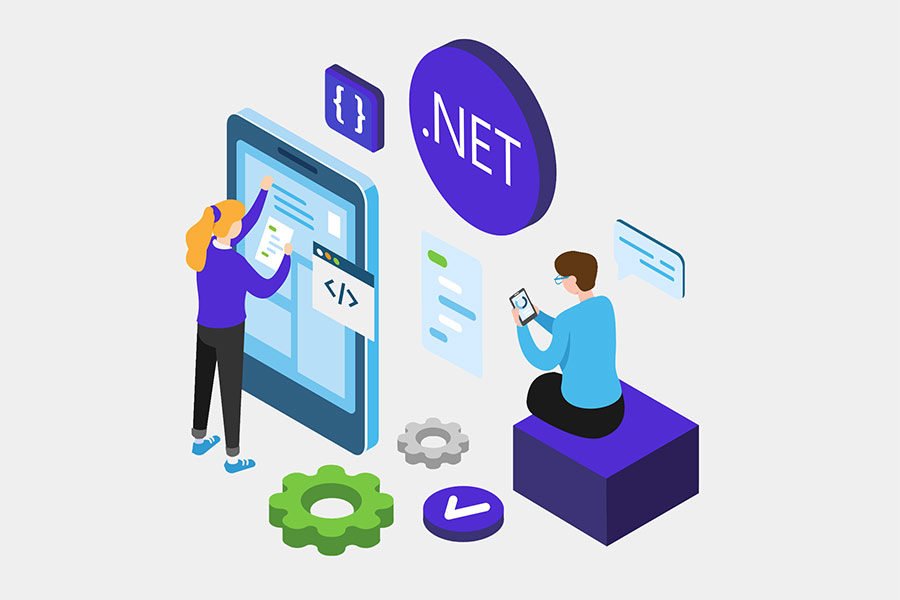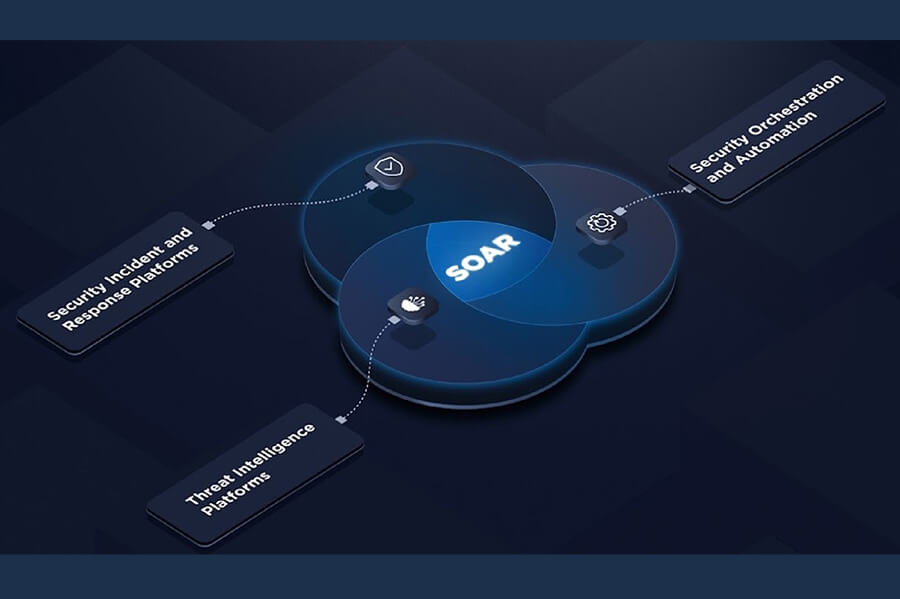.NET Development: The Candidate to Dominate the Market in 2025
More than 70% of Fortune 500 companies use .NET for their most critical systems, which shows its colossal potential. By 2025, .NET could dominate the USA market with 40%, beating others with its flexibility and strong security.
This growth isn’t a coincidence. The USA market is moving towards scalable and affordable solutions. .NET has grown from its early days to being cloud-ready with Microsoft Azure. As companies seek better ROI and new ideas, .NET is ready to lead. It tackles big issues like security and makes things easier to deploy.
The Current State of .NET Development in the American Tech Landscape
.NET development is key in the USA market. It has grown from a closed system to an open-source, cross-platform tool. Microsoft’s move to .NET Core and .NET 5+ has made it more appealing. Now, it helps businesses build reliable tech solutions.
Evolution of .NET Framework to .NET Core and Beyond
.NET was once only for Windows, but it became open-source and works on Linux and macOS. This change made it more compatible and modular, drawing developers worldwide. It now supports cloud apps, meeting business needs for speed and performance.
Market Share and Adoption Rates in the USA
In the USA, .NET is used in over 38% of enterprise systems. It’s popular in finance and healthcare. Developers like it because it works well with Microsoft Azure. The need for .NET skills keeps growing as companies seek secure and scalable options.
Comparison with Other Development Frameworks
Java and Python are prominent in certain areas, but .NET is better for high-throughput systems. It beats Node.js in performance and cloud use. Even though it’s not as fast for web development as Ruby on Rails, it’s vital for big, important projects.
Why .NET Development Will Dominate the Tech Market in the USA in 2025
Experts say .NET development will lead the tech market in the U.S. by 2025. This is because .NET meets today’s business needs and works with old systems. A 2024 Forrester report shows that 70% of big companies will spend more on .NET by 2025. They like its ability to work on different platforms and grow with their needs.
Microsoft’s constant innovation is a big reason for .NET’s popularity. NET 8 is 30% faster than older versions, making it great for busy apps. Big names like Bank of America and Walmart use .NET for essential tasks. This shows it’s reliable and helps it grow as more businesses choose it.
More companies want a single place to develop and manage apps. With Visual Studio and Azure, developers can work smoothly across the cloud and on-premises. This makes apps go live faster, up to 40% quicker. As Amazon and Microsoft keep improving .NET tools, it becomes even more vital for today’s developers.
.NET is becoming a key choice for businesses wanting to stay ahead. It offers fast performance, better security, and tools that developers love. These features make .NET a top pick for 2025’s tech goals, bringing tangible benefits and results.
Enhanced Security Features Driving Enterprise Adoption
Modern businesses face many cybersecurity threats. .NET development offers unmatched security benefits. It focuses on protecting sensitive data and meeting organizations’ needs.
Enterprises seek a balance between innovation and safety. .NET meets this need by providing tools to combat today’s most significant risks.
Advanced Authentication and Authorization Capabilities
.NET’s authentication frameworks make securing user access easier. They use OAuth 2.0 and role-based authorization to control access, ensuring that only authorized users can interact with systems.
Multi-factor authentication (MFA) support also reduces breach risks. This is especially important for industries handling financial or healthcare data. These features make .NET a top choice for critical applications.
Built-in Protection Against Common Vulnerabilities
.NET automatically defends against OWASP top vulnerabilities. It blocks cross-site scripting (XSS) and SQL injection attacks. Anti-forgery tokens prevent cross-site request forgeries (CSRF).
Microsoft’s updates keep threats at bay, reducing the need for manual patching. This proactive approach lowers the risk of breaches, a key advantage in competitive markets.
Enterprise-Grade Security Compliance
NET’s compliance with global standards boosts enterprise adoption. It meets GDPR, HIPAA, and PCI-DSS regulations, making it a strategic choice for regulated sectors.
Auditors and compliance officers confirm .NET’s ability to minimize legal risks. This shows why .NET is essential for scaling secure operations without sacrificing performance.
Cross-Platform Compatibility: Breaking Down Technical Barriers
.NET’s success lies in its ability to work on Windows, Linux, and macOS. This means apps built with .NET run smoothly on all three platforms. It saves time and money by avoiding the need for different code versions.
Businesses can quickly deploy their solutions on various platforms without losing performance. This is a big advantage in today’s fast-paced market.
Tools for net development make working on multiple platforms easier. The same code works on different operating systems, saving time and boosting efficiency, helping companies grow faster.
.NET stands out because it offers top-notch performance and a great developer experience. Its ability to work on different platforms makes it perfect for today’s diverse markets. As we move forward, .NET will continue to lead the way in creating flexible and powerful apps.
Cost-Effectiveness and ROI for Modern Businesses
Choosing the right tech stack is key for modern businesses. It’s about finding a balance between innovation and budget. .NET focuses on cost-effectiveness, helping companies to reach their goals without spending too much.
Businesses can stay ahead by making workflows more efficient and using fewer resources. They can also see actual returns on their investment.
Reduced Development Time and Resources
.NET tools like Visual Studio and NuGet speed up development. Developers with .NET skills can create complex apps faster, saving labor costs. This means less time and money spent on development.
Pre-built libraries and reusable code also cut down on redundant work. Projects get done faster without losing quality.
Lower Maintenance Costs
.NET’s unified architecture helps reduce code fragmentation and fixes. NuGet manages packages and ensures backward compatibility. This means fewer updates and lower maintenance costs.
With less money spent on maintenance, businesses can focus on growing strategically.
Scalability Without Proportional Cost Increases
NET’s scalable solutions avoid the high costs of traditional scaling. Cloud integrations with Azure help apps grow efficiently and handle traffic spikes without more infrastructure.
This approach keeps costs down, allowing businesses to grow sustainably and meet changing market demands without breaking the bank.
Cloud-Native Integration with Microsoft Azure
Developers building modern apps get a big boost from cloud-native integration with Microsoft Azure. .NET’s strong connection to Azure makes deploying and scaling apps easy. This includes features like Kubernetes orchestration and serverless functions. It all helps teams focus on new ideas, not just setting up infrastructure.
Seamless deployment and scaling are at the heart of this partnership. .NET developers can use Azure’s tools to automate resource setup, which means apps run smoothly in hybrid or multi-cloud setups. Containerization and auto-scaling also reduce deployment time and keep performance high.
DevOps and CI/CD pipelines also play a big role. Azure DevOps and GitHub Actions offer workflows for .NET projects. These pipelines speed up code-to-production cycles, reduce errors, and speed up time to market. They include built-in testing and release management.
Cloud services like Azure AI, analytics, and IoT are also part of the package. They work well with .NET, making it easy to add AI insights or process data in real time. According to 2024 data, over 80% of companies say they get to market faster with this setup.
Performance and Speed: Building High-Performance Applications
Modern .NET development focuses on making apps fast and efficient. It uses advanced runtime optimizations, such as better just-in-time compilation and garbage collection, to ensure that apps can handle a lot of work without slowing down.
For fast systems like financial trading or IoT, .NET keeps memory use low, reducing delays. Tests show that .NET apps start up quicker and use less CPU than Java or Node.js, making them great for businesses needing to scale quickly.
Apps in healthcare and logistics use .NET because it can handle many tasks simultaneously. Its async model ensures that apps can handle many requests smoothly. Companies using .NET see their deployment times cut by 40% and keep latency low, which is key in today’s fast-paced markets.
.NET’s benefits go beyond speed. It also means less downtime, better resource use, and money savings. As companies look to be more agile, .NET is at the forefront with its speed and cost savings. These improvements fit 2025’s tech trends, where fast apps are crucial for staying ahead.
Comprehensive Tools and Libraries Ecosystem
The .NET ecosystem offers developers a wide range of tools and libraries that help make modern app development more straightforward. Visual Studio is at the heart of this ecosystem, offering AI coding help, real-time debugging, and performance checks.
These tools reduce errors, speed up app releases, and improve coding by reducing repetitive tasks.
Visual Studio and Developer Productivity
Visual Studio has an innovative interface and tools, such as code completion and automated refactoring, help developers write better code faster. It also has testing tools for unit and load tests.
This ensures apps run well without extra work. It makes sure apps meet performance standards easily.
NuGet Package Management
NuGet offers over 300,000 packages for developers. This means quick access to pre-made components for data processing or API integration tasks. It saves time and cuts down on errors.
The package manager also keeps track of versions. This makes sure packages work well across different projects.
Third-Party Integration Capabilities
.NET makes it easy to connect with other systems. Developers can easily link to legacy databases, cloud services, or open-source tools supporting hybrid environments.
It allows teams to use what they already have while adding new technology, avoiding expensive rewrites.
Strong Community Support and Developer Availability
.NET’s success comes from its strong community support. Millions of developers around the world are active. Platforms like Stack Overflow and GitHub see over 120,000+ contributions each year to .NET projects. Knowledge sharing leads to constant innovation and problem-solving, making businesses feel more secure.
Latin America has become a key player in the tech world. Countries like Mexico and Colombia have many skilled developers who know .NET. U.S. companies choose nearshore teams in these areas for cost-effective, high-quality work. Microsoft’s training programs and certifications, like its Learn platform, are helping to grow this talent pool.
Why choose Latin America? It’s close to U.S. time zones, has bilingual talent, and is cheaper to operate. This region’s adoption fits Microsoft’s goal of supporting global developer ecosystems. For businesses, this means faster project completion and the ability to adapt quickly to market changes, keeping .NET competitive in 2025.
How .NET is Shaping the Future of Technology in America
By 2025, .NET will lead the tech world. It supports many platforms, offers top security, and works well with Microsoft Azure. These features meet today’s business needs.
Developers use Visual Studio and NuGet to work more efficiently and save money. .NET grows with businesses, helping them save money. It also keeps data safe from threats, making it reliable for companies.
Thanks to its open-source nature and strong community, .NET is also key in AI and edge computing. It’s a smart choice for companies looking ahead, and its flexibility and performance make it essential for America’s tech future.








